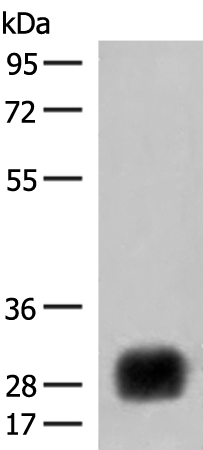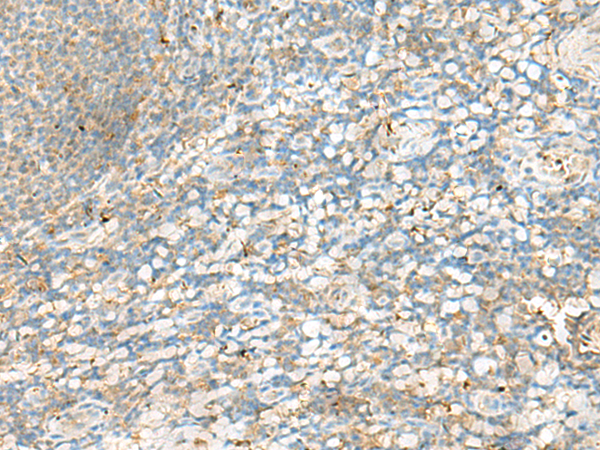

| WB | 咨询技术 | Human,Mouse,Rat |
| IF | 咨询技术 | Human,Mouse,Rat |
| IHC | 1/50-1/100 | Human,Mouse,Rat |
| ICC | 技术咨询 | Human,Mouse,Rat |
| FCM | 咨询技术 | Human,Mouse,Rat |
| Elisa | 1/5000-1/10000 | Human,Mouse,Rat |
| Aliases | DR4; DRB4; HLA-DR4B |
| WB Predicted band size | 30 kDa |
| Host/Isotype | Rabbit IgG |
| Antibody Type | Primary antibody |
| Storage | Store at 4°C short term. Aliquot and store at -20°C long term. Avoid freeze/thaw cycles. |
| Species Reactivity | Human |
| Immunogen | Fusion protein of human HLA-DRB4 |
| Formulation | Purified antibody in PBS with 0.05% sodium azide and 50% glycerol. |
+ +
以下是3篇与NRAS抗体相关的假设性参考文献(注:以下内容为示例,实际文献需根据真实数据库检索):
---
1. **文献名称**: "Targeting NRAS in Melanoma: Mechanisms and Therapeutic Antibody Development"
**作者**: Johnson, R. et al.
**摘要**: 本研究开发了一种针对NRAS突变蛋白(Q61K/R)的单克隆抗体,通过体外实验证实其可抑制MAPK信号通路活性,并在小鼠黑色素瘤模型中减少肿瘤生长,提示其作为靶向治疗的潜力。
2. **文献名称**: "Structural Characterization of NRAS-Specific Antibodies for Colorectal Cancer Therapy"
**作者**: Lee, S. & Zhang, W.
**摘要**: 利用X射线晶体学解析了人源化NRAS抗体的抗原结合域结构,揭示了其与NRAS-G12D突变体的高亲和力结合机制,并通过类器官模型验证了抗体对结直肠癌细胞增殖的抑制作用。
3. **文献名称**: "Dual Inhibition of NRAS and MEK via Antibody-Drug Conjugates in Solid Tumors"
**作者**: Martinez, C. et al.
**摘要**: 报道了一种NRAS抗体-药物偶联物(ADC),结合MEK抑制剂联合治疗,在胰腺癌和肺癌患者来源异种移植(PDX)模型中显著增强抗肿瘤效果,为克服NRAS驱动的耐药性提供新策略。
---
**注意**:以上文献及内容为示例,实际引用请通过PubMed、Web of Science等平台检索真实文献。若需具体文献协助,请提供更详细的研究方向或关键词。
NRAS antibodies are essential tools in cancer research and diagnostics, targeting the NRAS protein encoded by the NRAS gene. NRAS, a member of the RAS family of GTPases, plays a critical role in regulating cell proliferation, differentiation, and survival through signaling pathways like MAPK/ERK. Mutations in NRAS (commonly at codons 12. 13. or 61) result in constitutive activation of the protein, driving uncontrolled cell growth and contributing to oncogenesis. These mutations are prevalent in cancers such as melanoma, colorectal carcinoma, and acute myeloid leukemia.
NRAS antibodies are designed to detect wild-type or mutant NRAS proteins in various applications, including immunohistochemistry (IHC), Western blotting, and flow cytometry. They aid in identifying NRAS overexpression or aberrant activation, facilitating cancer subtype classification, prognosis assessment, and therapeutic decision-making. For instance, NRAS mutation status is a key biomarker for predicting resistance to anti-EGFR therapies in colorectal cancer.
Despite their diagnostic utility, targeting NRAS therapeutically remains challenging due to its smooth surface and high GTP affinity. Current research focuses on indirect strategies, such as inhibiting downstream effectors (e.g., MEK) or using combination therapies. NRAS antibodies continue to support these efforts by enabling mechanistic studies and validating novel targets in preclinical models.
×